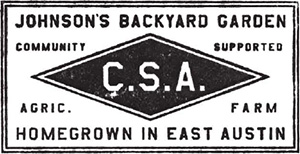
FROM THE FARMER'S PERSPECTIVE
05/16/13 — Farm
 JBG Tranplants. Photo by Scott David Gordon
JBG Tranplants. Photo by Scott David Gordon
The Safe Seed Pledge
You may have read in the news this week about the Supreme Court case that pitted a soybean farmer against Monsanto. The farmer lost the case, adding another win and further legal protections for GMO crops. This made me concerned again about the increase in use of GMO seeds. I also started thinking about the need for clear labeling on products containing GMO ingredients. Having this kind of labeling is the only way that consumers can make an informed choice about the food they eat and vote with their dollars.
Back in 1999, High Mowing Organic Seeds, along with nine other seed companies, took a stand against GMO (genetically modified organism) seeds by creating the following Safe Seed Pledge:
"Agriculture and seeds provide the basis upon which our lives depend. We must protect this foundation as a safe and genetically stable source for future generations. For the benefit of all farmers, gardeners and consumers who want an alternative, we pledge that we do not knowingly buy or sell genetically engineered seeds or plants. The mechanical transfer of genetic material outside of natural reproductive methods and between genera, families or kingdoms poses great biological risks, as well as economic, political and cultural threats. We feel that genetically engineered varieties have been insufficiently tested prior to public release. More research and testing is necessary to further assess the potential risks of genetically engineered seeds. Further, we wish to support agricultural progress that leads to healthier soils, genetically diverse agricultural ecosystems and ultimately healthy people and communities."
The National Organic Program rules and regulations prohibit all certified organic growers from using GMO seeds. However, this is not the primary reason I don't use them. I personally believe we shouldn't be using GMO's, and so I am taking the added step of signing the Safe Seed Pledge. I applaud High Mowing Seeds founder, Tom Stearns, for having the foresight to create such a pledge back in 2001. GMO's were introduced back in the 1990's, and their presence has since grown substantially. Now, the vast majority of US processed foods contain GMOs; however, unlike in Europe, food containing GMOs doesn't have to be labeled in the US. As a diversified vegetable grower, there are lots of things that worry me about the dramatic increase in the use of GMOs, including what I've listed here:
-Many GMO's are engineered to be herbicide resistant (to the weed killer, Roundup, mainly). The reason behind this is, if you make the plant super-resistant to herbicide, you can use a lot more of these chemicals to get rid of weeds and still not kill the crop. This means that more and more harmful chemicals are being put into the soil and damaging the environment. Eventually, the over-use of herbicides could make weeds less resistant, creating a bigger problem in the long run. Also, GMO crops such as field corn, potatoes, sweet corn, and soybeans have been genetically engineered to produce the Bt protein. Bt on its own is an organically-approved way of controlling worms that affect many crops. What's worrying to me is that genetically engineering plants to produce this protein themselves may cause worms to develop an increased resistance to it. This would then render Bt no longer effective for organic and conventional growers alike.
-Use of GMO's creates less plant diversity since seed companies only sell a very limited assortment of GMO variety types. As a farmer, I can't stress how much I love to grow so many different varieties of vegetables. For me, it is exciting that all of this variety exists within each type of crop, and, every year, I look forward to trialing something new at JBG. GMO's threaten to diminish this variety by replacing all of the varieties within a type of plant and with far fewer GMO versions. The thought of this as a farmer makes me both angry and fearful - angry because I do not want to lose the diversity I love and fearful because I know that relying on one variety can lead to catastrophic crop failures. One of the reason we plant so many different varieties of vegetables is to protect against this kind damage.
-As a father, I worry about the health effects of GMOs since these haven't been adequately researched. At a minimum, I feel strongly that, as in Europe, all food that contains GMOs needs to be labeled.
I tend to be a pretty positive, solution-oriented person, and I think that this is what makes me suitable for farming. If there is a problem, I try to solve it. The issue of GMOs, though, feels huge and certainly beyond my individual control. One thing that I think we all can do is to put pressure on the FDA to require food containing GMOs to be labeled. Then, we would at least have the power to make informed choices about the food we purchase. Finally, as a farmer, I want you to know that JBG does not and will not use GMO seed. To do so would both violate the National certified organic rules we follow as well as go against my personal beliefs.
The problem of GMO vegetables hits close to home. For example, GMO vegetables such as sweet corn, summer squash and zucchini, potatoes, soybeans, and radicchio are already in area supermarkets and usually aren't labeled.  You can rest assured, though, that the vegetables you get in your JBG CSA box or from our booth at the farmers market are all GMO-free.






 0 ITEMS IN CART
0 ITEMS IN CART 

